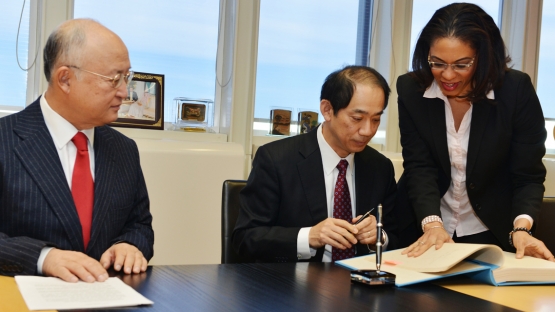Japan has submitted its instrument of acceptance to the Convention on Supplementary Compensation for Nuclear Damage (CSC), an important international instrument relating to liability and compensation for damage caused by a nuclear accident, triggering its entry into force.
The Permanent Representative of Japan to the IAEA, Ambassador Mitsuru Kitano signed and delivered the instrument of acceptance to IAEA Director General Yukiya Amano on 15 January 2015.
Congratulating the Government of Japan, Director General Amano said that this depositary action marks an important occasion, "as it paves the way for the Convention to enter into force three months from now, on 15 April."
Director General Amano further mentioned that "the use of nuclear power looks set to continue to grow throughout the world in the coming decades and it is important to have adequate compensation schemes in place." He noted that a number of instruments existed in this field, including the Vienna Convention, the Paris Convention and the Joint Protocol linking the two, and that the upcoming entry into force of the Convention on Supplementary Compensation for Nuclear Damage "is a valuable additional step towards establishing a global nuclear liability regime."
Ambassador Kitano in his remarks stated that joining the CSC was an important step for Japan, an occasion that will lead to its entry into force, which is of great significance for the international community.
He further mentioned that Japan as a country that experienced the accident at the Fukushima Daiichi nuclear power station in 2011 has a responsibility to contribute to the establishment of a global nuclear liability regime. As there is an increased interest in nuclear power and energy, Japan would continue to encourage other countries, especially in Asia, to join the Convention.
A global nuclear liability regime that addresses the concerns of all States that might be affected by a nuclear accident with a view to providing appropriate compensation for nuclear damage is one of the elements of the Action Plan on Nuclear Safety adopted by IAEA Member States after the March 2011 Fukushima Daiichi Nuclear Power Plant accident.
The CSC, which was adopted on 12 September 1997 to modernize and enhance the international legal regime in light of the 1986 Chernobyl accident, is an additional important step in this direction.
The Convention has two main objectives. The first is to establish a global nuclear liability regime in which all States may participate. Accordingly, the Convention is open not only to States that are party to an existing nuclear liability convention, but also to other States, provided that their national legislation is consistent with uniform rules on civil liability laid down in the Annex to the Convention.
The Convention also aims to increase the amount of compensation available in the event of a nuclear incident by establishing a minimum national compensation amount and an international fund, to which Contracting Parties will be expected to contribute in the event of a nuclear accident.
The Convention now has 19 Signatories and six Contracting States. With Japan joining the Convention, it will enter into force on 15 April 2015. The adherence of at least five States with a minimum of 400 000 units of installed nuclear capacity was required to bring the Convention into force, which has now been met.


